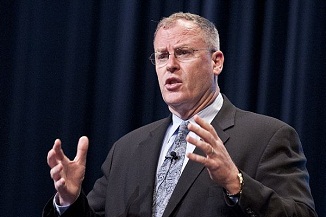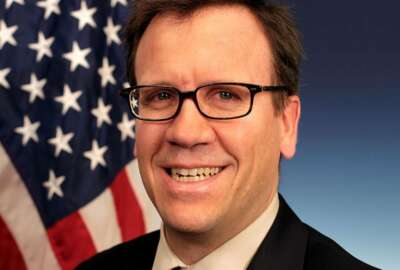
DARPA: Next-generation artificial intelligence in the works
The head of DARPA pushed back on concerns that countries like Russia or China could soon outpace the U.S. on artificial intelligence developments.
The head of the Defense Department’s advanced research arm pushed back Thursday on concerns that countries like Russia or China could soon outpace the U.S. on artificial intelligence developments.
Steven Walker, director of the Defense Advanced Research Projects Agency, told reporters that DARPA, which has worked on artificial intelligence since its inception in the 1960s, will play a leading role in developing the next-generation of AI breakthroughs.
Walker’s comments came in response to claims made by Eric Schmidt, the former CEO of Google’s parent company, Alphabet, over the last few months that near-peer adversaries, like Russia or China, could overtake the U.S. when it comes to new AI developments.
“I don’t think we’re falling behind. DARPA certainly is investing in the next generation of AI pretty heavily,” Walker said at an event hosted by the Defense Writers Group.
While federal agencies over the past few years have looked at using AI to bolster cybersecurity or reduce the human work-hours on redundant tasks, DARPA has found major applications for AI in the defense community.
Earlier this month, DARPA completed its end of an autonomous ship project called Sea Hunter and handed it over to the Office of Naval Research. DARPA outfitted the ship with software and sensors to help it navigate without human oversight, while still complying with maritime law.
In light of these achievements, Walker said DARPA is developing the next-generation of AI, aimed at addressing some of the critical gaps he’s seen with the cutting edge of modern artificial intelligence.
Walker described the current generation of AI as its “second wave,” which has led to breakthroughs like autonomous vehicles. By comparison, “first wave” applications, like tax preparation software, follow simple logic rules and are widely used in consumer technology.
While second-wave AI technology has the potential to, for example, control the use of the electromagnetic spectrum on the battlefield, Walker said the tools aren’t flexible enough to adapt to new inputs.
“They’re trained on massive data sets, they do a great job in pattern recognition and looking for images … but they’re still very brittle. If you change the data that they’re trained on, you put new data into the system, into the database, they tend to start to fail. They can be tricked easily. There are lots of folks looking at how you would trick an AI system, we’re starting to look at that, and from the initial things I’ve seen, it doesn’t take a lot to trick an AI system. We have more work to do, I think, in second wave, in terms of making them more robust,” Walker said.
The third wave of AI will rely on contextual adaptation — having a computer or machine understand the context of the environment it’s working in, and being able to learn and adapt based on changes in that environment.
Walker said DARPA has several programs working on developing third-wave AI.
“These are a very nascent effort and basic research efforts, but they’re going to be important if you want the warfighter to trust the machine and trust the answer the machine is giving the warfighter to help him or her make a decision,” he said.
Why other countries don’t have DARPA
Before becoming DARPA’s director, Walker served as the agency’s deputy director for more than four years. Over the last few years, he’s been working to help countries like South Korea, Japan, the United Kingdom, France and Germany develop their own versions of DARPA.
“One thing I want to make clear is I actually support our allies and partners trying to stand up a DARPA,” Walker said.
While those efforts have not yet panned out, Walker said a key to DARPA’s success in the U.S. has been its rapid influx of new talent.
“Every culture’s different though. So I think one of the reasons why it works here is compared to some other countries, we have a risk-taking culture. We have folks who are willing to come to a place, have a job for three years and then get booted out, which is actually what happens. … We get new people in the door with new ideas all the time who are not bound by 10, 20, 30-year-old thinking,” he said.
Copyright © 2024 Federal News Network. All rights reserved. This website is not intended for users located within the European Economic Area.
Jory Heckman is a reporter at Federal News Network covering U.S. Postal Service, IRS, big data and technology issues.
Follow @jheckmanWFED





